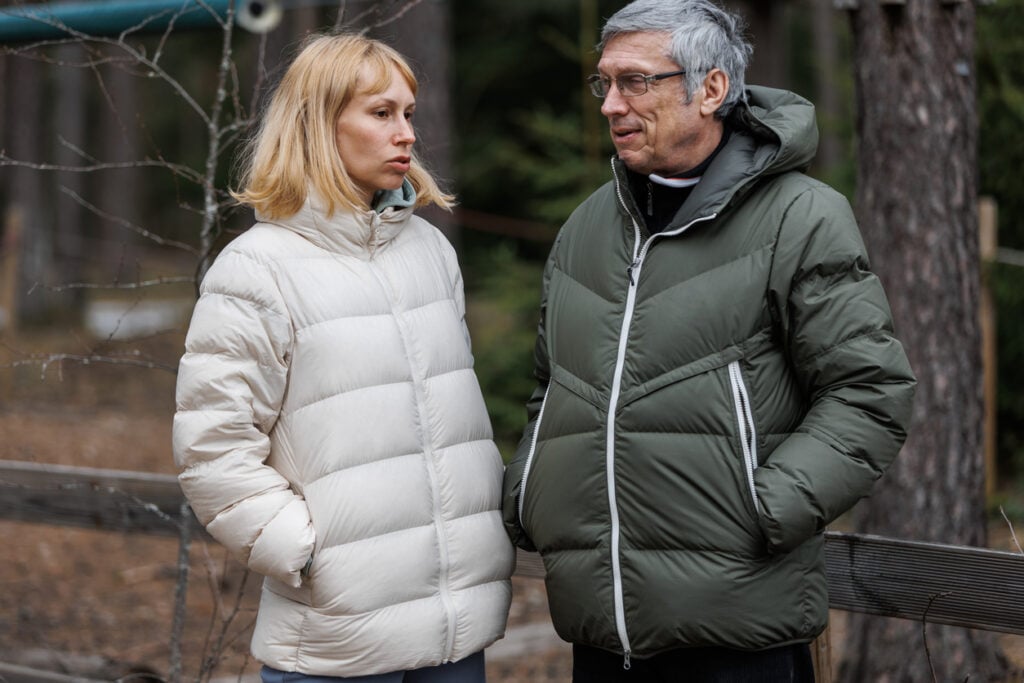Bridging the generational language gap one awkward phrase at a time.

Millennials have spent their lives navigating cultural, economic, and technological shifts at a breakneck pace. So when Boomers casually toss out phrases that feel like relics from another dimension, it’s no surprise they’re met with puzzled expressions and polite nods. These linguistic artifacts often seem totally out of sync with modern language and sensibilities.
This generational confusion isn’t just about age—it’s about context. Many expressions that made perfect sense in the post-war decades now land with all the grace of a dial-up modem at a TikTok convention. Some are outdated, some are hilariously specific, and a few are just plain baffling. Still, they carry echoes of a different world—and sometimes, those echoes are louder than expected.
1. Take a chill pill.

This phrase exploded in popularity during the 1980s but lingered well into Boomer vernacular, as reported by Merriam-Webster. The problem is, Millennials don’t usually frame emotional regulation with the metaphor of medicating. “Take a chill pill” tends to come off as dismissive or even condescending, especially in conversations where someone’s expressing genuine concern or anxiety.
For younger generations raised in a culture of emotional awareness, telling someone to “chill”—especially with a fake prescription attached—can shut down meaningful communication. It’s shorthand for “your feelings aren’t valid,” which rarely goes over well. Boomers may mean it as lighthearted advice, but it often sounds like a brush-off. Millennials, more attuned to nuance in mental health conversations, hear something entirely different than intended.
2. Don’t touch that dial.

This phrase originally referred to the physical dials on radios and early televisions—a concept totally foreign to anyone raised on remotes, apps, and streaming services, as stated by NPR. When Boomers use it, they’re usually trying to be playful or maintain attention. But for Millennials, it lands somewhere between quaint and confusing.
Nobody under 40 has ever adjusted a TV with a dial unless it was in a thrift store. The reference simply doesn’t register as intuitive. Instead, it creates a momentary language barrier that feels like an unintentional time warp. What might sound nostalgic and clever to Boomers tends to elicit a furrowed brow or nervous chuckle from younger listeners just trying to keep up.
3. You sound like a broken record.

This one’s rooted in vinyl culture—when scratched records would skip and repeat the same lyric endlessly, as mentioned by Time Magazine. For Boomers, it’s an efficient way to say “you’re repeating yourself.” But Millennials, raised on MP3s and playlists, may grasp the general meaning without ever having experienced the phenomenon firsthand.
There’s a growing disconnect between idiom and experience. While the phrase technically makes sense when explained, the metaphor doesn’t evoke a visceral reaction the way it might for someone who actually owned a turntable. Instead, it can feel like one of those legacy sayings people repeat without fully understanding, making communication feel more performative than genuine.
4. Hang up the phone.

To Boomers, “hang up” is still the go-to way to end a call—even though physical phone receivers haven’t been “hung” in decades. Millennials, who tap a red icon or swipe to end a call, don’t naturally picture the action implied. It’s not that they’re confused by the words, but the visual imagery just doesn’t align with their lived experience.
The language lingers because it works, but it’s a quiet reminder of how much tech has changed the shape of everyday tasks. Some younger folks even use the term ironically now, especially when referring to landlines—which, to them, might as well be ancient artifacts alongside floppy disks and rotary dials.
5. Roll down the window.

This one’s often met with an internal head tilt. Millennials grew up with power windows, where a button replaces the crank. Yet many Boomers still say “roll down” even though there’s no rolling involved. It’s not a huge deal, but it subtly reinforces how fast technology has evolved—and how language sometimes lags behind.
When these phrases pop up in casual conversation, they don’t usually cause confusion as much as they signal a generational fingerprint. The words might not trip up Millennials, but they definitely make them pause. It’s a harmless leftover, sure, but one that makes it very clear who first learned to drive in a car that needed elbow grease to get a breeze.
6. That’s the bee’s knees.

This expression sounds more 1920s than 1960s, yet Boomers often heard it from their parents and passed it along with a smirk. Millennials, who grew up with phrases like “lit” or “slaps,” usually recognize the phrase as intentionally goofy or retro. Still, they might wonder what bees and knees have to do with excellence.
When Boomers use this, they’re usually aiming for a fun, nostalgic vibe. But to Millennials, it can come off as either theatrical or totally out of left field. The phrase has no modern equivalent, which is part of its charm—but also its downfall when clarity is the goal.
7. That and a dime will get you a cup of coffee.

This one always needs unpacking. To Boomers, it’s a dry way of saying “your opinion isn’t worth much.” The problem? Coffee hasn’t cost a dime since the Eisenhower era. Millennials, staring down five-dollar lattes, hear this and immediately think, “Where is this magical café and how do I find it?”
The metaphor loses power when the cost comparison becomes laughable. Boomers may find it clever, but Millennials might interpret it as disconnected or even a bit smug. It’s one of those expressions that instantly reveals the age of the speaker, for better or worse.
8. Put a sock in it.

Harsh and abrupt, this phrase is a vintage way of telling someone to be quiet. For Millennials, it carries a surprisingly aggressive tone, especially when there are softer or more respectful ways to ask for silence. It evokes an image that’s both outdated and unnecessarily forceful.
In professional or emotionally aware environments, language like this can backfire. It feels authoritarian and dismissive—two vibes Millennials generally try to avoid in favor of collaboration and empathy. Even when used jokingly, it often feels jarring.
9. You’re cruising for a bruising.

This threat-lite expression might sound more like a movie quote than a serious warning. Boomers may recall hearing it in classrooms, on sitcoms, or shouted across 1950s playgrounds. Millennials, though, often interpret it as cartoonishly old-fashioned or weirdly violent for a casual setting.
It’s not that the meaning is unclear—it’s the tone that’s out of step. The phrase carries a strange blend of faux-toughness and nostalgia that makes it more performative than practical. For Millennials raised on anti-bullying PSAs, it’s more eye-roll than red flag.
10. Heavens to Betsy.

This soft exclamation feels like it belongs in a black-and-white movie. Boomers may have heard it from grandparents or classic TV, but Millennials don’t typically express surprise using fictional female names. It sounds theatrical, old-timey, and almost sarcastic—especially when dropped into modern conversations.
While not confusing per se, it’s such an odd phrase that Millennials rarely know how to respond. It reads like a character quirk rather than a real emotion. In that sense, it adds distance to a conversation instead of connection.
11. Go pound sand.

Oof. This one’s deceptively harsh. Boomers might use it as a snappy dismissal without realizing how insulting it sounds to modern ears. Millennials, more used to direct communication or passive-aggressive texting, find it unnecessarily combative. What even is the end goal—sand pounding for emotional regulation?
To most Millennials, it reads as a hostile way of saying “get lost.” It’s not clever or funny—it’s just cold. While Boomers might think it’s harmless, tone and phrasing matter more than ever in an age where social nuance is king.
12. As the crow flies.

This spatial metaphor refers to the straight-line distance between two places—ignoring roads or obstacles. Boomers use it to describe how close something really is. Millennials might understand the basic meaning, but it feels like a riddle. Why a crow? Why flying?
The expression lands awkwardly in an era dominated by GPS apps and real-time route mapping. It’s another example of a phrase that makes sense in theory but lacks practical resonance for people who’ve never had to guess how far something is based on vague animal behavior.
13. More than you can shake a stick at.

The first question: why would anyone be shaking a stick to begin with? Boomers might use this to suggest “a whole lot of something,” but Millennials usually pause at the strange mental image. It doesn’t clarify anything—it just raises more questions.
Although it’s a harmless idiom, it doesn’t offer much value in conversation anymore. Millennials tend to favor more visual, literal language—this one sounds like it belongs in a dusty folklore collection. Unless used with humor, it rarely lands the way it’s intended.
14. Make hay while the sun shines.

Boomers tend to love this agricultural wisdom: take advantage of good conditions while they last. But Millennials, raised in cities and suburbs, don’t instinctively connect productivity with farming metaphors. They get the idea, but it doesn’t feel intuitive.
The phrase feels like a relic of Depression-era grit. Millennials might even interpret it as a subtle nudge to hustle harder—something they already hear too often. It risks coming off as preachy, especially in contexts where burnout and boundaries are bigger priorities than grinding.
15. You’re burning the candle at both ends.

This one has survived, but just barely. Boomers say it to mean someone is overworking, staying up late, and waking up early. Millennials understand the meaning—but associate it with stress culture and glorifying exhaustion, both of which they actively push back against.
While it’s still in circulation, it doesn’t carry the same cachet. Millennials prefer clearer language about energy, burnout, and mental health. The candle metaphor may endure, but the way it’s delivered can still feel out of touch depending on the context and tone.
